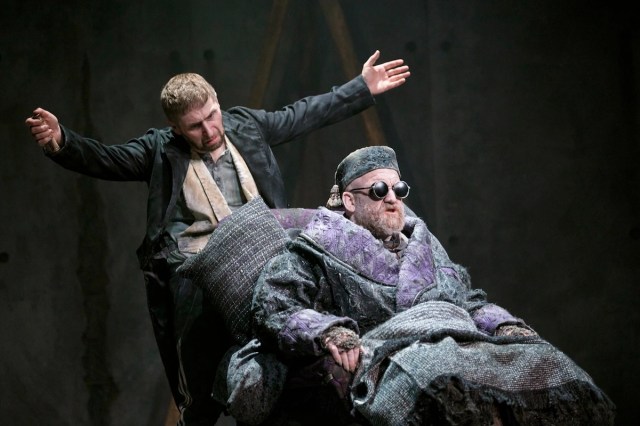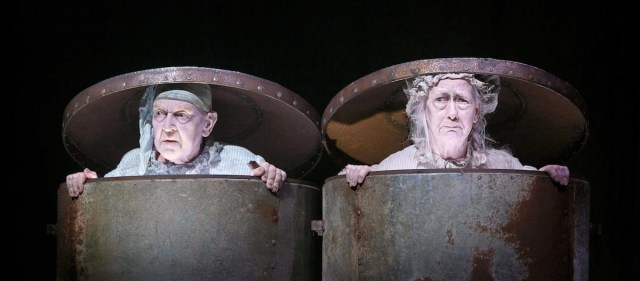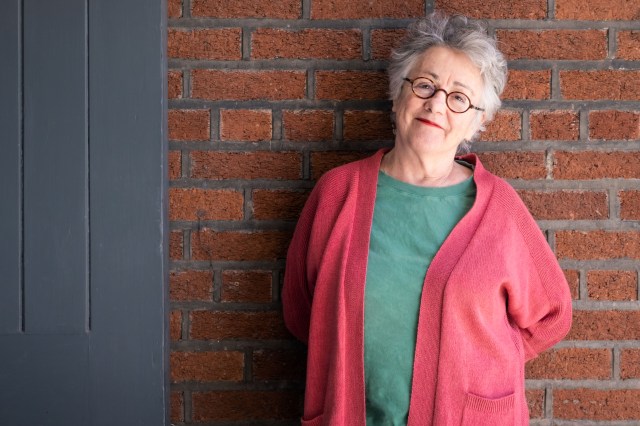 Aaron Monaghan and Rory Nolan in the Druid production of Samuel Beckett’s Endgame, directed by Garry Hynes, at Irish Arts Center.
Aaron Monaghan and Rory Nolan in the Druid production of Samuel Beckett’s Endgame, directed by Garry Hynes, at Irish Arts Center.
(© Ros Kavanagh)
In the great pantheon of Irish theater, there are legendary authors like Beckett and Friel and McPherson, Wilde and Shaw and Boucicault (all men). As far as directors go, one name stands out: Garry Hynes.
Fifty years ago, Hynes and actor Marie Mullen started the Galway-based Druid Theatre Company, dedicated to creating Ireland’s first professional theater company outside of Dublin, and (eventually) bringing it to the world. Known for its daylong repertory marathons of works by Synge and O’Casey and Lady Gregory, the company cemented its reputation in 1996 with its debut of Martin McDonagh’s The Beauty Queen of Leenane, which earned Mullen an acting Tony and Hynes a Tony for her direction, becoming the first woman to ever win in that category.
This month, Druid takes another field trip back to the Big Apple, with its acclaimed revival of Beckett’s Endgame (October 22-November 23 at the Irish Arts Center). In advance of the production, Hynes looks backwards and reflects on the journey.
This conversation has been condensed and edited for clarity.
First question: Is your Zoom background real? Because it’s stunning.
This is my study! My first passion and last passion will always be books. Everything that was in my life is in there.
Let’s actually start by going way back, since this is the 50th anniversary of your company, Druid. What was the impetus for its creation?
I’d been doing plays all through college in the drama sector and there were a couple of people, including Marie Mullen, with whom I became very close. As we approached the end of our university careers, I thought, I’m not going to be able to do this anymore. And I just said to Marie, “Will we found a theater company?” And she said, “Yes, thanks,” as if we’re going down for a coffee or something.
It was really founded to allow us to continue doing plays because the one thing we did know is that we didn’t want to leave Galway. We didn’t want to go and try and access the professional theater in Dublin, which literally meant nothing to us. And we thought, if Dublin has professional theater, why shouldn’t Galway have one? Galway and the west of Ireland became center of vision for the place. It came about as simply as that.
The word courage comes to mind. Would you agree with that descriptor?
No, not really, not courage. Maybe a refusal to take no for an answer. Maybe a kind of boneheaded, head down, keep going. I wouldn’t say it was courage in the classical sense of courage. No, it wasn’t. And it was hard at times. And it was kind of depressing and dispiriting at times, but, at the end of the day, the reward is in the room with the actors and in the room with the actors and the audience. That’s never been hard.
How did New York become part of the story for you and Druid?
I went to New York first when I was about 17 on what they call the J-1 visa, where the students get work summers sponsored by a relative. I worked for summers in succession in New York and that’s where I started to see the kind of theater that I couldn’t even imagine in Ireland. There was no professional theater in Galway, and my parents went to amateur theater, which subsequently had a big impact on Druid. But it’s when I went to off-off-Broadway stuff and I saw theater being made by people who looked like me in small rooms. It was that experience, coming together with Galway and the West of Ireland, that really fit the vision of Druid.
 Bosco Hogan and Marie Mullen star in the Druid production of Samuel Beckett’s Endgame, directed by Garry Hynes, at Irish Arts Center.
Bosco Hogan and Marie Mullen star in the Druid production of Samuel Beckett’s Endgame, directed by Garry Hynes, at Irish Arts Center.
(© Ros Kavanagh)
What can people expect from Endgame?
They can expect Endgame. I’m very much a Beckett purist. He brought what is normally regarded as creative visionary work, and what you then bring…Well, first of all, you bring the actors. No actor—no matter if they’re completely faithful to every single piece of [text]—will [play] the same [version of a] character as another actor. And then you bring fidelity to his vision. I’ve accepted from the beginning that my way to Beckett is, by the closer I cleave to him, the better I understand the plays, and the better I feel our work is.
You’re going to be running at the same time as a potentially unconventional Waiting for Godot. What do you think?
I have no idea. Of course, it would be good if it’s good.
Fifty years is a long time in the world of theater. Looking back, what would you say to yourself when you were just starting out?
Keep going. You’re going to sometimes feel like walking away and just doing something else, but every moment is worth it, and every moment has been a privilege. I mean, to be in a room with a bunch of people, making something, it’s boring, it’s tense, it’s all of those things, but it’s also wonderful. Most people don’t get the kind of life I’ve had. The older I grow the luckier I realize I have been.

